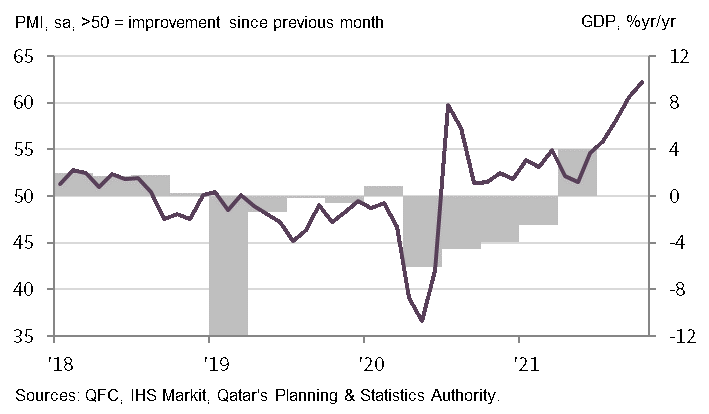Record expansions in both activity and new business in October

The latest Purchasing Managers’ Index™ (PMI™) survey data from Qatar Financial Centre (QFC) signalled a successive record improvement in operating conditions in the non-energy economy at the start of the fourth quarter. Output and new work both increased at the fastest rates since the survey began in April 2017, with activity growth especially marked in financial services and construction. The buoyant mood in the economy comes at a time of COVID-restriction loosening and record global LNG prices.
The Qatar PMI indices are compiled from survey responses from a panel of nearly 450 private sector companies. The panel covers the manufacturing, construction, wholesale, retail, and services sectors, and reflects the structure of the non-energy economy according to official national accounts data.
The headline IHS Markit Qatar PMI is a composite single-figure indicator of non-energy private sector performance. It is derived from indicators for new orders, output, employment, suppliers’ delivery times and stocks of purchases.
The PMI increased to a new record high for the second month running at 62.2 in October, from 60.6 in September. This indicated the strongest overall improvement in non-energy sector business conditions since the survey began four-and-a-half years ago. The headline figure has now risen for five consecutive months, also a survey record.
Since operating conditions began to improve again in July 2020, as the economy emerged from lockdown, the PMI has trended at 55.1, compared with a long-run average of 50.7 since April 2017.
The new record high set by the PMI reflects movement in the two largest components by weight - new orders (30%) and output (25%). Both these indicators ascended to new series peaks in October, with faster growth even than during the post-lockdown bounce in July 2020. The employment (20%) and stocks of purchases (10%) indices also had positive contributions to the PMI in October, albeit slightly less so than in September. Suppliers’ delivery times (15% weight) weighed slightly on the headline figure in October.
The record increase in total business activity reflected strong growth across all four of the broad sectors monitored: services, wholesale & retail, manufacturing, and construction. The latter posted a record increase in activity in October while, within the wider services sector, financial services was a stand-out performer with record growth in business activity.
Output was boosted by surging demand for goods and services in October, with the rate of expansion surpassing the previous record set in July 2020.The level of outstanding business rose for the thirteenth consecutive month, despite a concurrent increase in employment in the non-energy private sector. Increased demand for staff led to a fifth successive month of rising wages and salaries.
Companies were strongly confident of rising workloads over the next 12 months. Companies expected market conditions to improve further in 2022, with the forthcoming FIFA World Cup mentioned as an expected source of demand. By sub-sector, confidence was strongest among service providers.
Prices pressures continued to build in October, with average input costs rising for the sixth time in seven months. Companies raised their own prices by the most since March as a result
QFC Qatar PMI vs. GDP

The financial services sector expands rapidly in October
• New data signal booming financial services sector
• Fastest growth in new business over four-and-a-half-year series history
• Strongest hiring growth at financial firms in over two years
PMI data covering Qatar's financial services sector signalled rapid growth in October. Overall activity in the sector rose at the strongest rate over the four-and-a-half-year series history, as new business inflows surged higher.
In response to strong demand for financial services, companies in the sector boosted workforces at the start of the fourth quarter. The rate of job creation was the fastest since August 2019, and easily outpaced the expansion seen across the non-energy economy as a whole. Financial services companies remained optimistic regarding growth prospects over the next 12 months.
Cost pressures reached the highest since July 2020, leading to a robust increase in charges levied for financial services during the month.
"We are seeing very positive signs of economic recovery and growth in Qatar, which is mainly supported by the country’s commitment to a long-term economic diversification and its consistent efforts to implementing a national COVID-19 vaccination drive following the gradual reopening of the economy.”
“As Qatar Financial Centre, which is one of the key institutions directly contributing to Qatar’s economic diversification, we expect the national economy will experience strong revival in the coming year, with a promising growth outlook across the board, especially in the non-oil private sector.”
“We are glad to be playing a crucial role in the country’s economic growth now and over the years, and our contributions to diversifying several key sectors of the economy will continue in tandem with other ongoing national initiatives.”

Yousuf Mohamed Al-Jaida, Chief Executive Officer, QFC Authority



 Contrast View
Contrast View
 Increase Text
Increase Text
 Decrease Text
Decrease Text
 Reset Text
Reset Text



